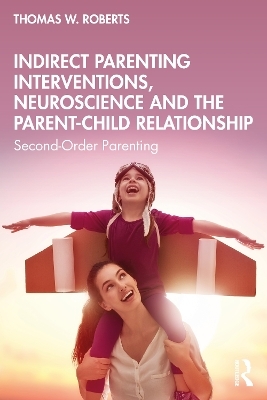
Indirect Parenting Interventions, Neuroscience and the Parent-Child Relationship
Routledge (Verlag)
978-1-032-46433-6 (ISBN)
Drawing on neuroscientific research in parenting, it provides a model for how children learn implicitly and how parents can relate to children through indirect means. Roberts argues that first-order parenting techniques, teaching specific behaviors to reduce unwanted child behaviors, are overused. He examines and offers guidance on how indirect interventions that place emphasis on the interactional components of the parent/child relationship, such as modelling, storytelling, reframing, humor, and paradox, can support parents and children in developing positive relationships.
• Addresses the latest brain research and its application to parent/child interactions
• Introduces the student to aspects of the parent/child relationship that are not covered in most courses
• Useful to clinicians who work directly with parents
• Offers a perspective on parenting that differs from most parenting models
• Facilitates awareness of how unconscious and nonverbal communication affects parenting
• Serves to deepen the relationship with the child and curb unwanted behavior
Indirect Parenting Interventions, Neuroscience and the Parent-Child Relationship will be thought-provoking reading for students and scholars of parenting and family systems, as well as clinicians who work directly with parents giving them a broader perspective in dealing with parent/child interactions.
Thomas W. Roberts received his Ph.D. degree from the University of Georgia in Child and Family Development. He came to San Diego State University in 1999 as Chair of the Department of Child and Family Development and was chair for nine years. He taught courses in family relationships and public policy and ethics. His research interests include divorce and remarriage, parenting, and applying neuroscience to family relationships. His current projects include how the unconscious plays the pivotal role in intimate family relationships. He has written grants on single-parenting, childhood obesity, early literacy, professional development for early childhood educators, and childhood safety.
Preface Part I. The Basics of Parenting and Family Development 1. Introduction to Parenting Models 2. What is Second Order Parenting? 3. Systems/Dialectical Theory 4. Factors that Impact Parenting 5. Parenting and Neuroscience Part II. Putting it All Together 6. Attachment, Systems Theory, and Neuroscience: Using Indirect, Implicit, and Paradoxical Methods 7. Modeling 8. Storytelling 9. Reframing 10. Humor 11. Confusion/Rope-a-Dope 12. Paradox 13. Postscript 14. Glossary 15. Index
| Erscheinungsdatum | 25.09.2024 |
|---|---|
| Zusatzinfo | 27 Tables, black and white; 11 Line drawings, black and white; 14 Halftones, black and white; 25 Illustrations, black and white |
| Verlagsort | London |
| Sprache | englisch |
| Maße | 156 x 234 mm |
| Gewicht | 520 g |
| Themenwelt | Geisteswissenschaften ► Psychologie ► Allgemeine Psychologie |
| Geisteswissenschaften ► Psychologie ► Entwicklungspsychologie | |
| Geisteswissenschaften ► Psychologie ► Familien- / Systemische Therapie | |
| ISBN-10 | 1-032-46433-X / 103246433X |
| ISBN-13 | 978-1-032-46433-6 / 9781032464336 |
| Zustand | Neuware |
| Haben Sie eine Frage zum Produkt? |
aus dem Bereich


